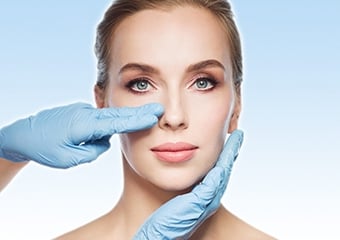Recommendations for skin problems after rhinoplasty surgery
The aesthetic appearance of the nose skin is as valuable as the post-operative nose form. Nose aesthetic surgery is an intervention performed directly on the face area. After this intervention, since the nose area remains banded for a long time, lubrication in the entire face, especially on the nose skin, and accordingly, blackheads and acne problems may occur. The expected post-operative lubrication and acne formation on the nose skin has become an important problem due to the obligatory use of masks.
Noting that the increase in rhinoplasty surgery and this situation brings with it the increase in skin problems, Ear Nose and Throat Specialist Op. Dr. Mustafa Demir made offers to prevent this situation, especially during the pandemic period.

The purity of the nose skin should be done regularly.
Demir stated that there are many oil and hair units in the skin. “Gypsum and taping applied after rhinoplasty cause oil production to increase and dead skin cells to clog skin channels and pores. During this period, bacteria accumulate and multiply in these pores. This situation, together with the obvious lubrication on the skin, causes the formations we call acne-filled acne. These skin problems can become annoying enough with the effect of increasing humidity and temperature, as the nasal skin, which is not cleaned adequately and correctly, remains under the mask for a long time. With the effect of mask use in the postoperative period, small red blisters such as redness or acne may develop in the nose, chin and cheek area, called ‘Rosase’. Another skin disease that increases in severity and frequency in this period is eczema, which we call seborrheic dermatitis, which causes redness, scaling and dandruff on the sides of the nose and beard area. In order to prevent this situation, it is very valuable to know the purity of the nose and the accompanying nose skin very well and to do skin care on time and with sufficient frequency. Depending on the skin thickness and structure of the patient, the recovery time of the skin may vary. Generally, this process is longer in thick and oily skin than in thin and normal skin. Therefore, patients with thick and oily skin should be patient and should not neglect skin care.said.

“The best time for skin care is after shower”
Demir said, “Although the skin care after rhinoplasty surgery varies according to the skin structure of the person, attention should be paid to the health of the skin and proper care should be taken after the bandages are removed,” Demir continued as follows: “Face area should be washed at least twice a day with water-based cleansing gels suitable for the skin type and care should be taken with restorative creams. These washing periods should be repeated at a frequency that will not allow the lubrication of the nasal skin in particular. Moisturizing with light moisturizers containing ceramide and hyaluronic acid and protection with appropriate barrier creams should be provided. In order to minimize lubrication in the post-operative period, it is beneficial to moderate the use of heavy-containing moisturizers and to prefer water-based moisturizers as an alternative to low-oil moisturizers. For a better facial appearance, this care should not be neglected and the doctor’s recommendations should be taken into account in the selection of skin care products. The best time to apply the products to be used to get rid of oiliness and blackheads is after the shower.

It is not recommended to wear make-up when wearing a mask.
Demir stated that by adding the peeling process to the skin care program from the first month after the surgery, clogging of the pores can be prevented. “The sun and situations that cause sweating should be avoided. Fluid consumption should definitely be increased, and healthy and stable eating habits should be adopted. It is not recommended to use make-up when using the mask, as it will clog the pores. In addition, since heavy makeup will increase both eczema and acne, it will be more real to avoid this application in the first months after the surgery. During skin care, it is necessary to avoid using items that will stick to the skin and to protect the face from very hot water and steam for the first three months against the risk of bleeding. Thick concealers, especially applied to the face area, accelerate the formation of acne. It is beneficial to keep the cologne and disinfectants that are used frequently during the day as far as possible from the face area.used his words.
“In the post-operative period, you can choose cotton masks with a soft inner part that you are sure of their protection. By using cotton masks, you can reduce the irritation of surgical masks on the skin.Demir, who made the offer, continued his words as follows: “In addition, attention should be paid to the fact that the mask used is wired and that the wire part is folded in a ‘U’ shape so that it does not touch the nose area tightly. The mask, which is used during the day, needs to be changed frequently. If a cotton mask is used and is used the next day without washing it or replacing it with a puck, acne formation may be triggered due to oil and sweat exposure from the dirty mask, even if the face is cleaned. Allergic eczema may develop in individuals who are sensitive to detergents used while washing cotton masks. In such cases, not using fabric softener and washing with soap powders instead of detergents will protect from allergic eczema, which we call contact dermatitis.

Pay attention to the first six months
Demir pointed out that since the skin of the nose is sensitive, it is necessary to prevent it from being exposed to direct sunlight within the first six months after the surgery. “In order to keep the nose skin healthy, it is very valuable to apply sunscreen to the nose and surrounding tissues, even if a mask is worn in summer. It is necessary to pay attention to the sunscreen factor 50. If you will be outside for a long time, it is beneficial to apply sunscreen every four hours. During skin care, it is necessary to avoid using elements that will stick to the skin and to protect the face from very hot water and steam for the first 3 months against the risk of bleeding. We should not forget that the smoothing process of the nose and the accompanying nasal skin continues. During skin care, it is necessary to treat the nose area softly and sensitively. The skin care products used before the surgery can be continued exactly. If new artifacts are tried in the post-operative period, some allergic reactions and undesirable conditions due to irritation may occur.”said.
Kiss. Dr. Mustafa Demir, “Despite paying attention to all the rules and practices we mentioned, if the formation of fat, blackheads and acne continues, it is useful to review the tension and dietary habits. Foods with high glycemic index and dairy products should not be consumed excessively because they trigger acne development.warned in his words.




